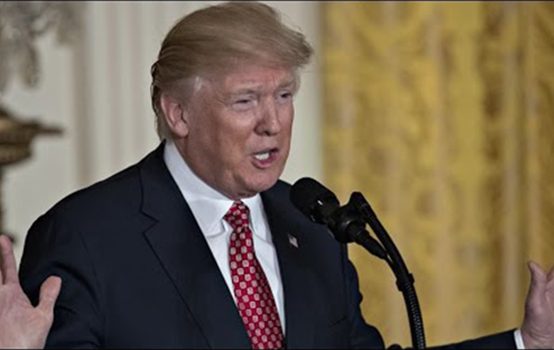Foreign Policy and Trump’s First SOTU

Like all State of the Union addresses, Trump’s first SOTU was full of boilerplate rhetoric and contained relatively few interesting remarks. The foreign policy section was not very long and fortunately included no surprises. Trump called for increased military spending as expected, he endorsed throwing away countless billions more on nuclear “modernization,” he committed to keeping the prison at Guantanamo Bay open, and he boasted about recognizing Jerusalem as the capital of Israel. All of these are bad and unnecessary decisions, but Trump didn’t make any news with these announcements.
Trump’s remarks on North Korea may have caused a lot of eye-rolling, but they were not “eye-opening.” They did confirm that the administration’s North Korea policy remains as hopelessly divorced from reality as ever. Trump said:
North Korea’s reckless pursuit of nuclear missiles could very soon threaten our homeland.
We are waging a campaign of maximum pressure to prevent that from happening.
Past experience has taught us that complacency and concessions only invite aggression and provocation. I will not repeat the mistakes of past administrations that got us into this dangerous position.
North Korea already has missiles and nuclear weapons that can threaten the U.S., so it is already too late to “prevent” this. In order to succeed, Trump’s “maximum pressure” approach would have to reverse North Korea’s missile and nuclear weapons programs, and there is no reason to believe that it can do that. For one thing, North Korea’s government believes these programs to be essential to their survival, and for another the U.S. cannot bring sufficient economic and diplomatic pressure to bear on North Korea to make them change their behavior on something so important to them.
The president has explicitly rejected talking to North Korea to make any progress on any issues, and he does so because he wrongly assumes that diplomatic engagement is responsible for creating the current predicament with North Korea. In typically myopic hawkish fashion, Trump believes that concessions only invite aggression, but the record shows that it was the rejection of an existing diplomatic agreement and resorting to dead-end pressure tactics that drove North Korea to withdraw from the Non-Proliferation Treaty (NPT) and to test their first nuclear weapons during Bush’s second term. It has only been when the U.S. and its allies have been willing to reach a compromise with North Korea on its nuclear program that they have had any success in influencing their behavior for the better. “Past experience” shows exactly the opposite of what Trump claims. It is no wonder that his North Korea policy has already failed on its own terms.
Trump imagines that he avoiding the “mistakes of past administrations” when he seems determined to repeat some of the worst errors of the Bush administration. Trump’s pressure tactics have been tried for more than a decade and have always failed, but he is committed to doing more of the same things that we already know don’t work. The goal of denuclearization is an obsolete one, and instead of breaking with the failures of his predecessors he remains wedded to an outdated goal that cannot now be achieved at an acceptable cost.
There were also some notable omissions in Trump’s speech. As usual, he had nothing to say about the war on Yemen or the Saudi-led coalition war crimes that the U.S. routinely enables. There was only passing mention of the war in Afghanistan that he escalated last year, and he had nothing to say about his illegal war in Syria. These are all failed and/or unauthorized wars. There is nothing for Trump to boast about with any of them, and so he says as little as he possibly can.
The foreign policy section of the speech was unsurprisingly light on substance and details, but it painted a picture of a thoroughly hard-line and militarized approach to the world that is going to cost the U.S. dearly.
Comments